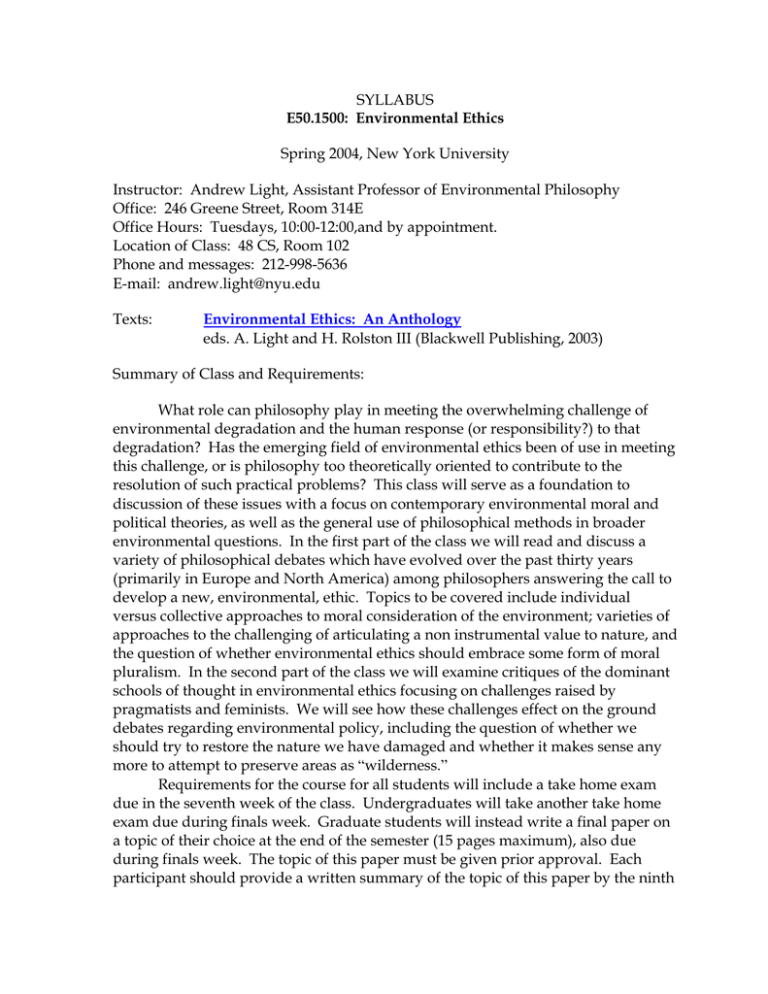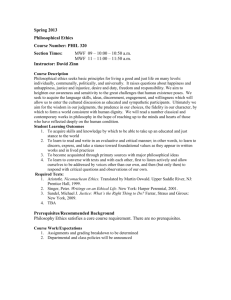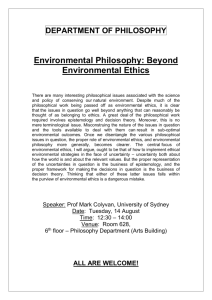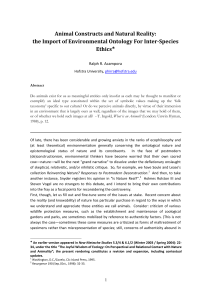SYLLABUS Spring 2004, New York University
advertisement

SYLLABUS E50.1500: Environmental Ethics Spring 2004, New York University Instructor: Andrew Light, Assistant Professor of Environmental Philosophy Office: 246 Greene Street, Room 314E Office Hours: Tuesdays, 10:00-12:00,and by appointment. Location of Class: 48 CS, Room 102 Phone and messages: 212-998-5636 E-mail: andrew.light@nyu.edu Texts: Environmental Ethics: An Anthology eds. A. Light and H. Rolston III (Blackwell Publishing, 2003) Summary of Class and Requirements: What role can philosophy play in meeting the overwhelming challenge of environmental degradation and the human response (or responsibility?) to that degradation? Has the emerging field of environmental ethics been of use in meeting this challenge, or is philosophy too theoretically oriented to contribute to the resolution of such practical problems? This class will serve as a foundation to discussion of these issues with a focus on contemporary environmental moral and political theories, as well as the general use of philosophical methods in broader environmental questions. In the first part of the class we will read and discuss a variety of philosophical debates which have evolved over the past thirty years (primarily in Europe and North America) among philosophers answering the call to develop a new, environmental, ethic. Topics to be covered include individual versus collective approaches to moral consideration of the environment; varieties of approaches to the challenging of articulating a non instrumental value to nature, and the question of whether environmental ethics should embrace some form of moral pluralism. In the second part of the class we will examine critiques of the dominant schools of thought in environmental ethics focusing on challenges raised by pragmatists and feminists. We will see how these challenges effect on the ground debates regarding environmental policy, including the question of whether we should try to restore the nature we have damaged and whether it makes sense any more to attempt to preserve areas as “wilderness.” Requirements for the course for all students will include a take home exam due in the seventh week of the class. Undergraduates will take another take home exam due during finals week. Graduate students will instead write a final paper on a topic of their choice at the end of the semester (15 pages maximum), also due during finals week. The topic of this paper must be given prior approval. Each participant should provide a written summary of the topic of this paper by the ninth week of the course. Graduate students may also submit rough drafts of the final paper for comments and suggestions for improvements up to one week prior to the final due date of the paper. Appeals of any grades must be made in writing (typed), providing a detailed argument for why a grade should be increased. Any work found to be plagiarized will be given a mark of 0 and disciplinary action will be taken. Late work will not be accepted. All students are expected to read all assingments in advance of the course and be prepared to discuss them in class. READING SCHEDULE* What is Environmental Ethics? J20: J22: Introduction to Class and Philosophical Methodology Overviews: Light & Rolston, p. 1 and Palmer, p. 15 J27: J29: Early Discussions: Leopold, p. 38 and Sylvan, p. 47 No class. Who Counts in an Environmental Ethics? F3: F5: Individualism: Singer, p. 55 Individualism: Regan, p. 65 F10: F12: Holism: Katz, p. 85 Problems with Holism: Varner, p. 95 Is Nature Intrinsically Valuable? F17: F19: Nonanthropocentrism: Rolston, p. 131 and Lee, p. 154 Weak Anthropocentrism: Norton, p. 163 and Hargrove, p. 175 Is There Only One Envioronmental Ethic? F24: F26: Pluralism and Its Critics: Stone, p. 193 Pluralism and Its Critics: Callicott, p. 203 Midterm Assigned M2: M4 Recovering Pluralism: Light, p. 229 Final Discussion of Major Debates in the Field Midterm Due What Alternatives Exist? M9: Deep Ecology: Fox, p. 252 and Naess, p. 262 M11: Ecofeminism: Gaard & Gruen, p. 276 & Warren and Cheney, p. 294 M16-M18: No Class – Spring Break M23: Pragmatism: Weston, p. 307 and Minteer & Manning, p. 319 M25: Summary Discussion of Alternatives Paper Topic Due for Graduate Students Focusing on Particular Environmental Issues M30-A01: Sustainability: Cobb, p. 359 and Jamieson, p. 371 A06-A08: Restoration: Elliot, p. 381, Katz, p. 390 and Light, p. 398 A13-A15: Wilderness: Nelson, p. 413, Callicott, p. 437 and Noss, p. 444 Human Social Issues and the Environment A20: Feeding People vs. Saving Nature: Rolston, p. 451 and Attfield, p. 463 A22: Human Rights and Env. Justice: Nickel & Viola, p. 472 A27: Sense of Place: Norton & Hannon, p. 500 A29 Environmental Education: Bennan, p. 516 Final Examinations, Specific Due Date TBA * Readings are listed by author’s last name and the first page of the assigned chapter.





